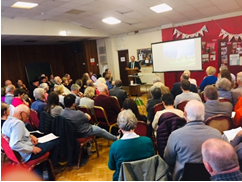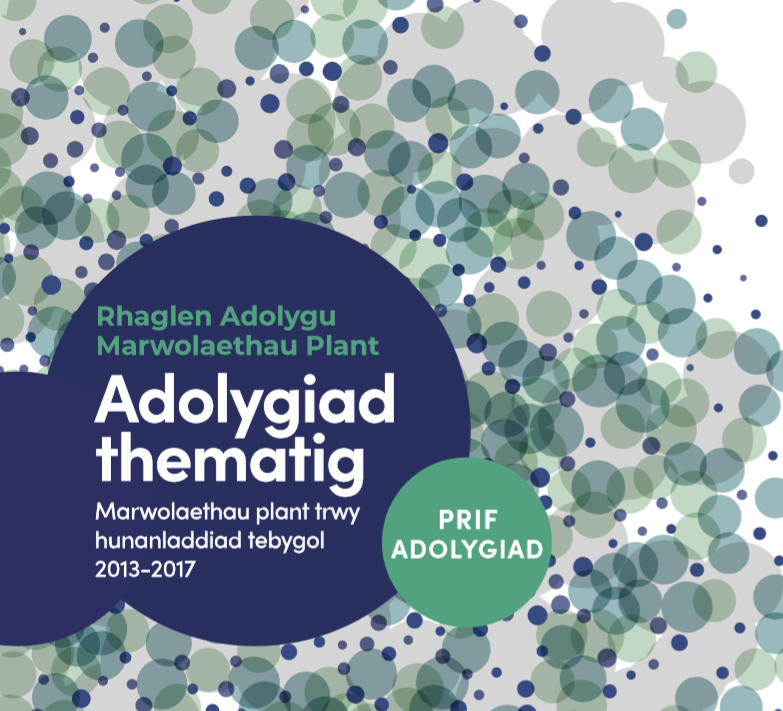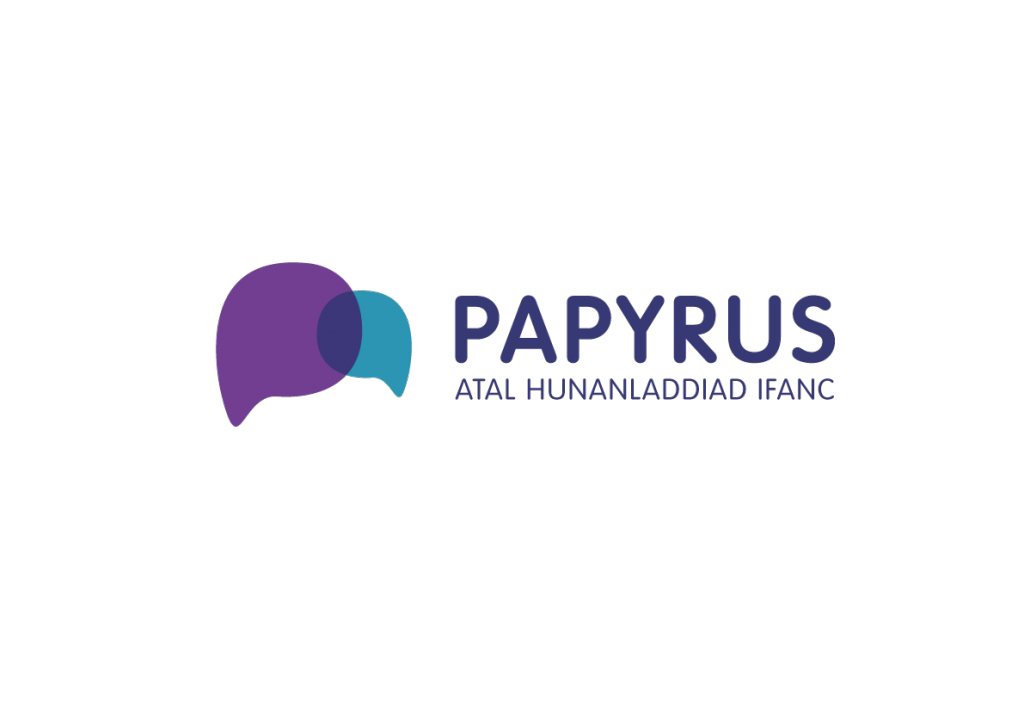With the result of the General Election on 12 December 2019, it became clear that the United Kingdom will formally leave the European Union on 31 January 2020, although there will be a brief transition period until the end of the year before most of the results of that decision will be implemented. Across the UK, and even more so in Wales, a majority of voters supported parties who promised to hold a further referendum regarding Europe, or to overturn the result of the 2016 referendum. However, a decisive majority of the MPs elected are supportive of implementing the result of that referendum.
During the first full week of 2020, the House of Commons passed the European Union (Withdrawal Agreement) Bill and passed it to the House of Lords. Although amendments (including some proposed on behalf of the Welsh Government) will be proposed there, as the Bill is a manifesto commitment by the winning party in a General Election, the Lords will not bar its progress. The Welsh Government has recommended that the Senedd should refuse its consent for the Bill, as the Scottish Parliament has already done, but this will not prevent its implementation either.
Nearly all churches in Wales, and Cytûn, have a neutral position regarding membership of the EU, but the work of Cytûn’s Wales and Europe Working Party will continue in the coming months, to monitor developments on behalf of our members, and continue to seek action in the areas of greatest concern to us. These include:
In the Queen’s Speech on 19 December 2019, the new UK Government announced an ambitious programme including 54 pieces of legislation. This appears to be a programme for a full Parliament rather than a single session, and the prioritisation is not yet clear – except that at least 12 pieces of legislation will need to be passed by the end of 2020 to deal with the consequences of leaving the European Union. These include substantial pieces of legislation in devolved areas such as agriculture, fisheries and the environment. It is not yet clear what the implications of this Westminster legislation will be for Welsh legislation, although the UK Government says that it will respect the devolution arrangements of the UK. Cytûn’s Policy Officer has prepared a summary of this legislative programme with some commentary regarding implications for Wales, and this can be obtained on application to gethin@cytun.cymru
The EU Citizens Rights project is delivered across Wales to support EU, EAA and Swiss nationals and members of their immediate families (of any nationality) to seek settled and pre-settled status under the EU Settlement Scheme (EUSS) in the UK. Citizens Advice Cymru have been awarded funding by the Welsh Government to deliver two services as part of the Project:
Generalist Advice Services: A client led provision that provides information, guidance, advice to simple settled status and pre-settled status applications (OISC Level 1) casework. Referrals to other services, including social welfare advice will be suggested where clients would benefit from further assistance in complex issues. We can also refer clients to Newfields Law who are running the contract for more complex applications at OISC Level 2 and 3 immigration advice.
Specialist Advice Services: This specialist advice will support EEA, EU and Swiss citizens to ensure they understand their workplace rights and are able to challenge exploitation, as well as working with employers to help them create compliant workplaces, which benefit all employees rather than individuals. This will include mediation and tribunal services.
The service will cover the whole of Wales until December 2020 and will be delivered through Flintshire Citizens Advice; Cardiff and Vale Citizens Advice and Citizens Advice Newport. Our Citizens Advice services will be supported by outreach / engagement activities undertaken by EYST (Ethnic Youth Support Team) who have a proven track record in working with and engaging community groups and organisations supporting migrant communities, including EU Citizens. EYST will be undertaking a number of activities designed to seek out individuals and groups and encourage the use of and make referrals to the advice services on offer.
Access to advice in relation to settled status and pre-settled status is available through our Wales helpline on 0300 3309 059. The website also includes information, including leaflets in 5 European languages, that you may share with those connected with churches and the wider community, and can be found here: https://www.citizensadvice.org.uk/wales/immigration/staying-in-the-uk-after-brexit/staying-in-the-uk-after-brexit/
THE WELSH BUDGET – A TASTE OF THINGS TO COME?
Because of the timing of the UK General Election, the Welsh Government’s draft budget for 2020-21 was announced in a written statement on December 16, and was not debated in the Senedd until January 7. The UK Government does not intend to announce its budget until March 11, and Welsh Government may need to make further changes to its budget as a result. The aim is to agree the final budget (following scrutiny by Senedd committees) on March 3, with any changes resulting from the UK budget to be included in a later supplementary budget.
Despite this uncertainty, Welsh Government anticipates that increased funding from the UK Government will be sufficient for it to increase expenditure in almost every sphere – although there has been criticism of a reduction in the budget for the Welsh language. The Senedd Research Service’s visual summary of the budget can be seen here, and independent analysis by the Wales Governance Centre can be accessed here.
Despite these expenditure increases, challenges remain. While Public expenditure in the UK is climbing close to its 2010 level, the population aged over 65, and therefore more likely to use public services, is now 8.4% higher than it was then.
The budget also offers real terms increases in the budget of each local authority in Wales for the first time for a number of years. The full figures can be seen here. Despite these increases, Local Government spending in Wales will still be 13.5% less in real terms than in 2010, and 16.2% less if the increase in population in the mean time is taken into account. Council Tax now accounts for over 30% of the income of Local authorities in Wales.
The figures above are taken from the Wales
Governance Centre’s presentation on the budget on 13 January 2020.
CHURCHES CALL FOR URGENT CLIMATE ACTION

The 90 people who attended Cytûn’s day conference on climate change in Community House, Newport, in October 2019 had no doubt of the urgency of the crisis facing the world. Subsequent events in Australia and elsewhere have only added to the urgency.
In November 2020, the next world leaders’ conference on climate change (COP26) will be held in Glasgow, and churches and Christian environmental and development charities will major on urging action on the governments of the UK and beyond during the year. Cytûn is involved in resourcing Climate Sunday, to be held during Creation Time (1 September – 4 October) 2020, and more details will be on the Cytûn website soon.
Following COP 25 in Madrid, Dr Olav Fykse Tveit, General Secretary of the World Council of Churches, wrote to all its members in December 2019 emphasising the importance of a Christian response to the emergency. Here is a slightly edited version of his letter.
“God saw everything that God had made, and indeed, it was very good.”—Genesis 1:31
I write to you today out of urgent and earnest concern for our world and the advancing peril represented by climate change. Our faith in the creator, our love for creation, and our discipleship in the company of Jesus are all being put to the test by this crisis.
In fact, our futures, the well-being of our common home, and the very existence of our species are at risk. The call to our churches and ourselves could not be clearer; and our unity, solidarity, and determination have never been more needed by the world.
What have we learned? In the UN climate talks at the Conference of Parties (COP 25) in Madrid during the first two weeks of December, we learned that 200 nations have failed to respond sufficiently to the growing urgency of the climate crisis. The outcomes were disappointing, with no increased ambitions to address to scale the adaptation, mitigation, and finance that are needed.
We have learned, too, from scientists and policy makers that the gap is widening between the steps taken by governments, on the one hand, and the compelling scientific evidence and moral obligation to act, on the other. The current rate of accelerated global warming is bringing the world closer to an irreversible tipping point. What we do over the next ten years to slow down global warming will determine the very future of our shared and only home—our oikos, the planet earth— for thousands of years to come.
We also learned in Madrid from the prophetic calls from youth, from Indigenous Peoples, and from climate victims to protect the earth. We listened to the strong voices of young people, including in the “Fridays for Future” actions, in response to the climate crisis. Indigenous Peoples, who are on the frontline of climate impacts, espoused alternative lifestyles and ways of living gently with the planet, raising their voices in defence of land, forests, and waters. Their prophetic calls were ignored. Rather, many leaders vilified them, and some of their leaders were publicly taunted and humiliated. We know better: Creation is a gift of God for us to care for and to share. The world is accountable to young people and the vulnerable people in the world, and it is morally inadmissible to look the other way.
What are we to do? The time for debate and disputation of established scientific facts is long over. The time for action is swiftly passing. We will all be held to account for our inaction and our disastrous stewardship of this precious and unique planet. The climate emergency is the result of our ecological sins. It is time for metanoia for all. We must now search our hearts and our most fundamental faith principles for a new ecological transformation, and for divine guidance for our next steps to build resilience in the face of this unprecedented millennial challenge.
As churches in fellowship, let us redouble our efforts to make a meaningful contribution in our own contexts to averting the most catastrophic consequences of further inaction and negative actions by governments. Let us join in confronting this global crisis through concerted advocacy for zero fossil fuel use and a “just transition.”
As ecclesial actors in the public sphere, let us press relentlessly for public officials and governments and business to keep faith with the people and their future. Let us advocate with our national governments to pursue the goals for addressing climate losses and damages, in mobilizing sufficient and additional finances, and in radically reducing emissions to keep global warming to 1.5 C.
Leaders in business and government, we need you to step up to your role to serve in an accountable manner. Particularly leaders of wealthy nations, who have historically been responsible for the carbon emission, as well as the new and emerging carbon emitters, need to pave the way to provide financial support in solidarity with the vulnerable communities around the world facing the loss and damage due to climate change. Countries that produce fossil fuel must develop plans for downscaling this pillar of their economy and proactively change their focus to global sustainability and renewable energy, as many in the business world already do.
Nations and international agencies, we also need you to step outside your transient comfort zones, to transform policies, take responsibility, and act against the unbridled consumption pattern that is destroying our planet. Sea level rise, greenhouse gases, hurricanes, cyclones, and droughts cannot be stopped at national borders. Destruction of forests, wiping out of ecosystems, and dispossession and displacement of Indigenous Peoples—these sap the very life out of our one living planet.
As individual Christians in local communities, let us pray for our planet and each other, critically interrogating our own lifestyles and economies to discern what is most needed in our families, communities, and local contexts and then committing with others to addressing them head-on.

As people of faith and goodwill, let us unite across religious traditions and divides to nurture and protect creation for all living creatures today and for generations to come. In Jesus’ incarnation, we rejoice in God’s resounding yes to earthly life and human flourishing. Faith in the God of life, indomitable hope in God’s promise of a new earth, and love moving us to creative commitment are our greatest contributions as Christians and Christian churches to securing the lives and futures of the whole human family. Let us rise to this greatest challenge, uniting to protect creation and God’s creatures today and for coming generations.
Christian Aid will be at the heart of the response to the climate emergency during 2020, along with its fellow members of Stop Climate Chaos Cymru and the Churches pushing for a positive result from COP 26.

The central campaign will be the call for a new deal for climate justice from the UK Government, specifically to:
- transfer its fair share of finance and technology to poor and climate-vulnerable countries
- stop fuelling fossil fuel expansion and support clean, renewable energy instead
- develop renewable energy without exploiting people or destroying the environment in the Global South
- curb the over-consumption that is driving climate breakdown
- invest in decarbonising the UK economy in a way that addresses economic and social inequalities.
Further details will soon be available on Christian Aid’s website, but you can get started by signing the petition now.
UPDATED WELSH INDEX OF MULTIPLE DEPRIVATION

In November 2019, the Welsh Index of Multiple Deprivation 2019 was published, updating the indices published since 2005. The index weights a host of statistics relating to each small area in Wales (1909 in total) measuring their population in terms of income, employment, health, education, access to services, housing, Community safety and physical environment. Welsh Government has created an interactive tool which allows users to examine the data, including searching by postcode and by parliamentary constituency. The index is used for a number of official; purposes by the Welsh Government (such as locating Flying Start services), and it is used also by other bodies, such as by some churches when setting denominational contribution rates.
Taking everything together, the five most deprived areas are two in western Rhyl, Lansbury Park Estate in Caerphilly, the Penrhys area in the Rhondda, and the Caerau area of Bridgend. The results report includes an analysis of areas of ‘deep-rooted’ deprivation. This shows that the five most deprived areas in 2019 have been amongst the most deprived since 2005, and there has already been debate in the Senedd about how to tackle longstanding deprivation of this kind. It is certain that local churches will have valuable experience to contribute to this discussion.
The five least deprived areas can be found in
Swansea (Newton and Mayals), Church Village near Pontypridd, Marford and
Hoseley in Wrexham and south Mold.
Minimum price for alcohol in Wales – what churches need to know
Andrew Misell, Director for Wales at Alcohol Change UK, looks at what church ministers, officials and volunteers might need to know about the new minimum price for alcohol in Wales.
On 2 March, we’ll be seeing a big change to the way alcohol is sold in Wales. Minimum unit pricing (MUP) has been described as “an important contribution to reducing the devastation caused by alcohol-related harm in Wales”. But many people are still unsure what MUP is, why it’s being introduced, and what it will mean for them. Those are questions I’ll be seeking to answer here.
We’ve known for years that the price of alcohol is one of the most important factors influencing how much people drink. Most drinkers are sensitive to price, even if they don’t always realise it. The Welsh Government is seeking to use price to reduce heavy drinking, and so reduce harm, by setting a baseline price of 50p below which a unit of pure alcohol – that’s 10ml or 2 teaspoons of pure alcohol – cannot be sold. A pint of beer has around 2½ units of pure alcohol in it, and so, from March 2020, it cannot be sold for less than £1.25 (2½ x 50p). A bottle or wine has around 10 units and so will not be sold for less than £5 (10 x 50p).
You can see straight away that this will have no impact on pub prices. Where it will be felt is in supermarkets and other shops. Our research indicates that the biggest impact will be on cheap, strong ciders – often sold in large plastic bottles. The prices of some cheap fortified wines and spirits are also set to rise. Some supermarket discounts – such as 25% off six bottles of wine, or second slab of beer for half the price of the first one – will not be possible if they bring the price down below 50p per unit.
Moderate drinkers are unlikely to notice much difference, but there will be a big impact on the heaviest drinkers, and that may include some of the vulnerable drinkers who use church-based services across Wales, such as night-shelters, food distribution teams and advice sessions. Evidence from Scotland – where they’ve had MUP for more than a year – does not suggest that it leads to some of the serious problems that were feared, such as drinkers going into uncontrolled withdrawal, stealing alcohol, or turning to other drugs. But many heavy drinkers will notice that their usual drinks have either gone up in price or are no longer on sale. So, it will be worth staff and volunteers who have contact with heavy drinkers being alert to this and being aware that it might come up in conversation. It will also be worthwhile making sure that staff and volunteers know which local services they can contact or refer people to with alcohol problems – there’s a full list of these on the DAN 24/7 website.
For any questions or for more information on MUP, please contact Andrew Misell on andrew.misell@alcoholchange.org.uk, 029 20226746 or 0755 2474446. Information will also be posted on the Welsh Government and Alcohol Change UK websites.
£5-a-week food service tackling poverty in Cardiff

Almost a third of households in Cardiff are living in poverty. Nearly half of them are in Ely. With more than 3,000 homes where the household income is below 60% of the median income Ely is the most deprived suburb in the city. But since last summer Church Action on Poverty (a member of Cytûn’s sister network, Churches together in Britain and Ireland), in partnership with ACE (Action in Caerau & Ely) are trying to change that with an innovative subscription service that aims to save families money and also cut food waste. Your Local Pantry can be found at the Dusty Forge on Cowbridge Road West.
The centre was set up as an alternative to foodbanks. For just £5 a week members can select at least 10 items of food, including fresh fruit and vegetables. Organisers say members end up with a basket of food worth around £20. The food comes from surplus stock from supermarkets.
AVERTING THE TRAGEDY OF YOUNG SUICIDE

National Charity PAPYRUS Prevention of Young Suicide says that findings from a long awaited publication led by Professor Ann John of Swansea University offer clear opportunities to introduce interventions that could help to save young lives. The review, part of the Public Health Wales’ Child Death Review Programme, examined the deaths of 33 children and young people aged between 10-17 years who died in the last five years, probably by suicide.
Said Kate Heneghan, Head of PAPYRUS in Wales: “The challenge now is for those of us in a position to influence and change policy in Wales to really push for those opportunities to be embraced with vigour, determination and urgency.
“We have been aware of an increase in the number of deaths by suicide in the 15-19 year old age group for a number of years. This review helps us to better understand what factors may contribute to this and what may help to prevent these suicides. Many of the issues the report raises as possible contributing factors, such as sexual abuse, bereavement, domestic violence, educational problems, self-harm, substance misuse, bullying and social media are consistent with what we hear from young people on our HOPELINEUK helpline every day of the week.”
The review cites stigma as a major challenge to suicide prevention effort. PAPYRUS believes that talking about suicide is the only way to challenge stigma and we know that talking openly encourages young people struggling with thoughts of suicide to seek help. By asking ‘are you having thoughts of suicide?’ you have conveyed that you are a safe person to talk to and will help them to seek help. It takes seconds. You should never hesitate: you could save a life. “This is why we believe suicide prevention training is imperative for professionals who work with young people,” said Kate Heneghan.

“What really struck a chord was reading about the number of young people included in the report who had episodes of self-harm where parents were unsure how to respond. All too often at PAPYRUS we hear from bereaved parents who say they felt lost, they didn’t know what to do or where to turn and wished they had known about our helpline service when they were struggling to keep their child safe.

PAPYRUS Prevention of Young Suicide is a charity that was established in 1997 by a group of parents who had lost children to suicide. Its mission is to prevent young people (under the age of 35) taking their own lives. PAPYRUS believes that many young suicides are preventable and seeks to support young people going through crisis via a national helpline HOPELINE UK (0800 068 41 41) which is open to both young people and professionals and parents who work with them. We also train professionals and others who come into contact with young people and seek to influence government policy on suicide prevention.
Though HOPELINE UK has always been open to callers from Wales, since January 2019 there has been a dedicated Welsh base for PAPYRUS in Cardiff and from here courses are run for Welsh organisations who want to help create suicide-safer communities. PAPYRUS staff also travel around Wales raising awareness of issues related to young suicide and delivering training in suicide prevention.
PAPYRUS has worked with a number of churches to
promote knowledge around suicide prevention and help to challenge the stigma
around talking about the issue. If you would like to find out more or would like
any of the PAPYRUS materials or training, please contact David Heald, Regional
Manager for PAPYRUS on david.heald@papyrus-uk.org or 029 20789755.
NEW AFFORDABLE HOMES ON CHURCH LAND IN CARDIFF
Six new affordable homes will soon be available in Cardiff as a result of a partnership between a church and local housing association facilitated by Cytûn member Housing Justice Cymru.

Pentyrch Street Baptist Church in Cardiff had surplus land next to the church, and the Housing Justice Cymru Faith in Affordable Housing (FiAH) project facilitated a partnership with Cadwyn Housing Association to build six new affordable homes on the land.
Faith in Affordable Housing is an innovative project of Housing Justice that aids churches of all denominations to release surplus land and buildings for affordable housing, enabling the church to directly benefit the community rather than selling on the open market.
The new one-bedroom self-contained apartments are designed to fit with the existing residential area and adjacent church. They benefit from a highly efficient design to minimise energy running costs and will include communal areas inside and outside the building for the enjoyment of residents.
Director of Housing Justice Cymru Sharon Lee said: ‘This development in the heart of Cardiff will provide much needed homes for rent, and has helped to support the great work the church is doing with the community. It shows how working together can make a difference.
Chief Executive of Cadwyn Housing Association Kath Palmer said: “Land for housing is scarce within the city, yet with approximately 8,000 people on the Common Housing waiting list in Cardiff, it’s vital we continue to build new homes to help meet the demand. By working together with the church in this way we are able to make a difference.”
Pastor Rob Morse of Pentyrch Street Baptist Church said: ‘Christ encourages his followers to be radical in mind and action. Nothing short of active love girded by faith will bring true hope. We are grateful for this partnership in helping to create a space where everybody has somebody.’
The new homes in Cardiff follow other successful schemes enabled by FiAH in recent years at Merthyr Tydfil, Newport, Bridgend and Swansea with a number of future schemes emerging across north and south Wales.
CONTACTING CYTÛN’S POLICY OFFICER
Please note our new office address and telephone
Parch./Revd Gethin Rhys – Swyddog Polisi/Policy Officer
Cytûn – Eglwysi ynghyd yng Nghymru/Churches Together in Wales
Room 3.3, Hastings House, Fitzalan Court (opposite Brunel House), Cardiff CF24 0BL
Office tel: 03300 169860 Gethin direct dial: 03300 169857 Mobile: 07889 858062 E-mail: gethin@cytun.cymru www.cytun.co.uk @CytunNew
Hapus i gyfathrebu yn Gymraeg ac yn Saesneg. Happy to communicate in Welsh and English
Publication date: 14 January 2020. The next bulletin will be published on 13 March 2020.
